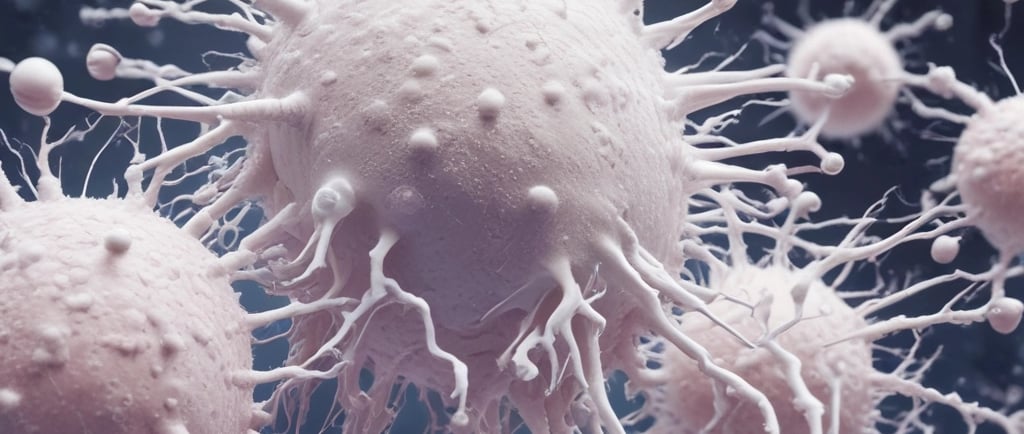Effects of Fungi on cancer
deep dive discussion and article on reducing cancer growth through mycology
Harry Langfrod
8/9/20254 min read


The Fascinating Relationship Between Mushrooms and Cancer: Separating Promise from Proof
Despite common misconceptions, mushrooms occupy a unique biological category that sets them apart from both the plant and animal kingdoms. As fungi, they represent what some nutritionists refer to as the "third food kingdom," offering a distinct nutritional profile that differs significantly from traditional plant and animal sources.
The fungal world presents an extraordinary diversity of edible options, with approximately 2,000 varieties available for human consumption. This vast array of species contains an equally impressive range of bioactive compounds, including essential vitamins, minerals, flavonoids, and powerful antioxidants. Some varieties even serve as natural sources of vitamin D, adding to their nutritional appeal.
Among the most intriguing aspects of mushroom research lies in their potential relationship with cancer prevention and treatment. This complex topic has generated considerable scientific interest, though the evidence remains mixed and requires careful interpretation.
Exploring the Cancer Prevention Connection
The question of whether regular mushroom consumption can reduce cancer risk has produced conflicting research results over the years. Some studies suggest protective benefits, while others fail to identify any meaningful correlation.
A notable 2010 Korean investigation found that increased mushroom intake correlated with reduced breast cancer risk specifically among premenopausal women. However, a comprehensive 2019 American study examining multiple cancer types found no significant protective associations with mushroom consumption.
To address these inconsistencies, researchers conducted a meta-analysis in 2021, systematically reviewing data from 17 separate studies. Their analysis revealed that higher mushroom consumption was indeed associated with lower overall cancer risk. Interestingly, when examining specific cancer types, only breast cancer showed statistically significant protective effects, though this finding may reflect the predominance of breast cancer studies in the available research literature.
The protective mechanisms behind these potential benefits remain under investigation. Researchers particularly focus on ergothioneine, a unique amino acid found in high concentrations within mushroom tissue. Since the human body cannot synthesize ergothioneine independently, dietary sources become essential for maintaining adequate levels.
This remarkable compound demonstrates powerful cellular protection against free radical damage, leading some scientists to propose its classification as a vitamin. The dramatic moniker "longevity vitamin" reflects the growing recognition of ergothioneine's potential health significance, though its precise biological roles remain incompletely understood.
Geographic variations in research outcomes add another layer of complexity to the mushroom-cancer relationship. Studies conducted in Asian countries consistently show stronger protective effects compared to those performed in Western nations. This disparity likely reflects cultural differences in mushroom variety selection, preparation methods, and consumption quantities between these regions.
Laboratory Research and Treatment Potential
Beyond dietary consumption studies, extensive laboratory research has investigated mushroom extracts as potential cancer treatments. While results show promise, the vast majority of this work remains confined to cell cultures and animal models, limiting its immediate clinical applicability.
A comprehensive review examining mushroom-based cancer treatments identified 92 different species demonstrating "promising anticancer effects" against 38 distinct cancer types. Remarkably, breast cancer cells appeared most responsive to mushroom compounds, with 61 different extracts successfully inhibiting tumor cell growth and division.
Promising Species Under Investigation
Several mushroom varieties have attracted particular research attention due to their demonstrated anti-cancer properties:
Agaricus brasiliensis, known colloquially as the "mushroom of the sun" or "God's mushroom," originates from Brazil's São Paulo region. Laboratory studies involving tumor-bearing rats showed that four different A. brasiliensis extract formulations successfully slowed tumor progression.
Antrodia cinnamomea, first scientifically described in 1995, represents a relatively recent addition to medicinal mushroom research. This Taiwanese species holds significant value in traditional Chinese medicine. Research involving both laboratory cell cultures and live mouse models demonstrated the extract's ability to reduce tumor size and inhibit growth rates in breast cancer.
Hericium erinaceus, commonly called lion's mane mushroom, combines edibility with therapeutic potential. Studies using mice with colon and lung tumors found that H. erinaceus extracts not only reduced tumor size but also prevented metastatic spread to other body regions.
Despite these encouraging preliminary findings, Cancer Research UK emphasizes that "no evidence currently exists that mushrooms or mushroom extracts can prevent or cure cancer" in human patients. However, they acknowledge early research suggesting immune system enhancement, which could theoretically improve the body's natural cancer-fighting capabilities.
Complementary Treatment Applications
Rather than pursuing mushrooms as standalone cancer treatments, some researchers investigate their potential as complementary therapies alongside conventional medical approaches.
Reishi Mushroom Studies
Research examining Ganoderma lucidum (reishi mushrooms) as adjunct therapy has shown encouraging results. A meta-analysis of five studies concluded that patients receiving G. lucidum supplements alongside standard chemotherapy or radiotherapy demonstrated improved treatment responses compared to those receiving conventional therapy alone. Additionally, mushroom supplementation correlated with enhanced immune system activity, though researchers acknowledge the overall evidence quality remains limited.
Shiitake Research
Shiitake mushrooms contain lentinan, a complex carbohydrate with thousands of years of medicinal use throughout Asia. A comprehensive review of 38 studies investigated lentinan's potential benefits for lung cancer patients receiving standard treatment protocols.
The analysis concluded that "lentinan effectively improves quality of life while promoting chemotherapy efficacy during lung cancer treatment." These findings suggest potential value in symptom management and treatment enhancement rather than primary therapeutic applications.
Broader Treatment Integration
A general review of mushroom integration with conventional cancer therapies found that while much existing research suffers from methodological limitations, the available evidence suggests potential benefits for patient outcomes. Most studies indicated that "mushroom treatments combined with conventional therapies improve patients' quality of life through enhanced physical, emotional, and cognitive function, plus improved sleep quality."
These findings point toward mushrooms' potential role in managing treatment side effects and supporting immune system function during cancer therapy, rather than serving as primary treatment modalities.
Current Limitations and Future Directions
The current state of mushroom-cancer research presents both exciting possibilities and significant limitations. While laboratory studies consistently demonstrate promising anticancer properties across numerous species, translating these findings to human clinical applications remains challenging.
The complexity of mushroom biochemistry adds another layer of difficulty to this research area. With over 2,000 edible species, each containing unique combinations of bioactive compounds in varying concentrations, identifying optimal therapeutic applications requires extensive investigation.
Practical Recommendations
Given the current evidence landscape, mushrooms represent an excellent nutritional choice for general health maintenance. Their rich content of dietary fiber, plant-based proteins, essential vitamins, minerals, and beneficial phytochemicals makes them valuable additions to balanced diets.
For individuals without mushroom allergies, regular consumption provides established nutritional benefits while potentially offering protective effects that future research may better define. However, those seeking cancer prevention or treatment should not rely solely on dietary mushroom consumption but should work with healthcare providers to develop comprehensive, evidence-based health strategies.
The future of mushroom-based cancer research holds considerable promise. As scientists continue investigating the vast array of available species and their unique biochemical profiles, we may eventually unlock therapeutic applications that harness fungi's remarkable biological diversity for human health benefit. Until then, enjoying mushrooms as part of a varied, nutritious diet represents a sensible approach to incorporating these fascinating organisms into our wellness routines.
